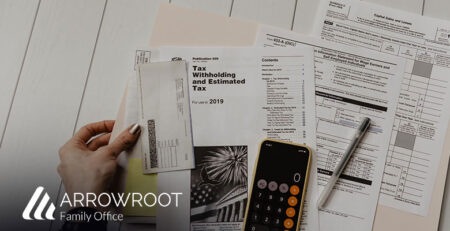Everything to know about First-Time Homebuyer Credit


Dan Casey
Vice President
Vice President, Financial Planner, and Portfolio Manager at Arrowroot Family Office. I manage clients’ investment portfolios and help them find solutions and optimal strategies for their financial needs. In addition to my passion for finance, I am an exercise physiologist with over a decade’s experience.
Buying a property for the first time can be an overwhelming process, especially if one does not have any resources or information needed to get started. When purchasing a property for the first time, it is necessary to be aware of the potential ways and strategies to reduce homeownership costs and uncover potential tax breaks.
An example of such a legal tax break that could reduce homeownership costs by a significant margin is the First-Time Homebuyer Act of 2021. While the bill is still awaiting passage in Congress, if passed, this act would provide a federal tax credit of up to $15,000 for first-time homebuyers.
What is a first-time homebuyer tax credit?
New homeowners, already responding to the many adjustments in take-home pay that homeownership costs can often bring, can receive tax credits to help with those ample accumulating housing costs. These tax credits often come as a welcoming relief for new homeowners, especially young individuals or couples with low-income streams. They work by lowering the amount of income tax that an individual or couple has to pay on their tax return for the year in which the property was purchased. However, unlike a tax deduction, tax credits do not reduce one’s taxable income.
The first-time homebuyer tax credit was originally first introduced on July 30, 2007 (as part of the Housing and Economic Recovery Act of 2008), and went into effect the following year on July 30, 2008, during the 2008 financial crisis. Originally designed to help stimulate the housing market and the overall economy by encouraging consumers to buy homes, it has created many opportunities that consumers are able to benefit from over a decade later.
The original first-time homebuyer tax credit granted first-time homebuyers a sizable tax credit of up to 10% of the initial home’s purchase price. The maximum amount allowed to be claimed was $8,000. Certain citizenship, income, and residency requirements were also required to be me.
This version of the tax credit expired in 2010, and since then, no additional first-time homebuyer tax credit has been passed in Congress as of yet. The First-Time Homebuyer Act of 2021 is the latest iteration that is making its rounds within Congress, and if passed, will provide immense benefit to first-time homeowners. While this act has yet to pass, it is essential to understand and know the bill before its passage in order to capitalize on this moment before the opportunity passes.

Helping you achieve your evolving financial objectives
What is the First-Time Homebuyer Act of 2021?
On April 28, 2021, Congressman and U.S. Representative Earl Blumenauer (D-OR) introduced the First-Time Homebuyer Act of 2021 to Congress. This legislation aims to incentivize generational wealth-building opportunities and housing stability for low and middle-class Americans, with the majority benefit aiming to help historically marginalized communities. If the bill were to be passed, it would provide a federal tax credit similar to the original first-time homebuyer tax credit that expired in 2010. This new national government program would give a tax credit for 10% of the home’s purchase price, or up to $15,000, to eligible taxpayers that meet certain citizenship, income, and residency requirements. Depending on the individual’s tax-filing status, the bill can limit the credit to $7,500 for married individuals filing separately. This proposal is still under review in Congress and needs to be signed into law by President Joe Biden before it can become effective. As of December 2021, the bill is still in need of approval from both the Senate and the House of Representatives before it can reach the President’s desk for signature.
What is needed to qualify for the First-Time Homebuyer tax credit?
In order to be considered a first-time homebuyer, one must meet any of the following requirements:
- Be a single parent who only co-owned a property with a former spouse while married.
- Be a displaced homemaker who has only owned a home with a spouse.
- Have only owned a home permanently affixed to a foundation.
- Have only owned a home that is not in compliance with state or local building codes and that cannot be brought into compliance for less than the cost of building a permanent structure.
Individuals who have not owned a home for three years prior to the passing of the bill may still qualify for the new first-time homebuyer tax credit if the legislation is passed. This is unlike the first-time homebuyer tax credit passed in 2008, which was strictly for first-time homebuyers with no exceptions. However, income would play a significant role in the qualification for the 2021 tax credit. This proposed bill would only support homeowners who have reported income that did not exceed 160% above the median household income in the area in which their primary residence is listed. The value of the home must also be at or below 110% of the area’s median property purchase price. The home purchased must also be the listed primary residence in the tax year it is being claimed, meaning that the property cannot be rented out or used as an investment. The property must be purchased and not acquired from another individual or direct relative. In addition, one can not claim the tax credit in another year, nor can one sell the home in the same year that they try to claim the credit. They must live at least four years in the home to keep the full tax credit. If one were to sell or move within four years of buying the home, they will have to pay back a percentage of the tax credit as follows:
- Within 1 year: Repay 100% ($15,000)
- Within 2 years: Repay 75% ($11,200)
- Within 3 years: Repay 50% ($7,500)
- Within 4 years: Repay 25% ($3,750)
Some additional requirements include:
- Cannot have used the tax credit previously.
- Must meet the income requirements for your area.
- Must be at least 18 years of age.
- Cannot purchase the home from a direct relative.
Other homeowner tax credits and options to be aware of:
There are numerous other incentives and grants available to first-time buyers in various states that have already been passed into law or are available to the everyday consumer. An example of one such benefit can include state-sponsored down payment assistance programs for first-time homebuyers with certain income limits. These programs are available in some selected states. First-time homebuyers can also qualify for the following tax breaks if all requirements are met:
- Mortgage Credit Certificate: This program allows an individual to claim a federal tax credit for a significant portion of their mortgage interest every year. The exact amount one can claim on their taxes varies by state, but usually between 20% to 40% of their total mortgage interest, or up to $2,000.
- Mortgage interest deduction: As a homeowner, one can deduct the interest that is paid on their mortgage up to $750,000. Itemized deductions are needed on one’s tax returns, and the full amount for the deduction may be limited depending on when the loan was taken out.
- Property tax deduction: Depending on the qualifying state, individuals may be entitled to claim some state or local tax deductions on their federal income tax return.
- Residential energy-efficient property credit: This incentive provides individuals with a federal tax credit for homeowners who have installed energy-efficient equipment in their homes. Examples of such equipment can include geothermal heat systems, energy-efficient plumbing, wind turbines, solar panels, and fuel cell property. The tax credit gained is equal to certain percentages of equipment cost and varies depending on the state in which the equipment was installed.
Local and state government websites list plenty more incentives and opportunities to partake in as first-time homeowners. Mortgage programs, loans, and grant options are available within The Department of Housing and Urban Development (HUD). Further research online is required to determine which option is right for you and your family and which of these opportunities you may be qualified for. Local lenders may also provide grants and loan options as well. In some cases, they are able to offer professional advice and information about the programs that exist and the application process required to receive those benefits. Freddie Mac, Fannie Mae, and other Federal Housing Association loans are also options for financial assistance. Each loan option allows an individual to benefit from a mortgage loan even with a down payment as low as 3%.
Veteran Affairs Home Loans are also an option for those coming from the military. V.A. loans require no down payment or private mortgage insurance, have limited closing costs, and tend to have easier credit requirements than traditional bank loans do.
For those considering buying a property in a small or rural town, a USDA Rural Development home loan may be of great use. This loan helps to encourage homebuyers to qualify for and receive low-interest home loans with low (or zero) down payments while living in low population areas. To qualify, one must have moderate to low income and purchase a home in an “eligible rural area” as designated by the USDA.
Finally, the IRS also allows first-time homebuyers to take up to $10,000 from their Roth and Traditional IRAs accounts to help buy or build a new home. This includes the ability to help put down a down payment and assist in closing costs or other related expenses that meet the federal requirements and criteria.
The IRS’s definition of a first-time homebuyer is an individual who has not owned a personal residence in two years. This definition is different from The Department of Housing and Urban Development (HUD), which states that a first-time homebuyer is an individual who hasn’t owned a personal residence in three years. Individuals are allowed to access those funds without paying the 10% early withdrawal penalty; however, regular income tax will have to be paid on the withdrawal instead.
Because the penalty-free $10,000 lifetime withdrawal is only per individual, a couple could withdraw a maximum of $20,000 from separate IRA accounts to pay for their first home. These funds need to be used within 120 days, or it does become subject to the 10% penalty.
FAQs
- U.S. Department of Housing and Urban Development. “HUD HOC Reference Guide: First- Time Homebuyers.”
- Internal Revenue Service. “Topic No. 503 Deductible Taxes.”
- Internal Revenue Service. “Instructions for Form 5695 (2020): Residential Energy Credits.”
- U.S. Department of Energy. “Homeowner’s Guide to the Federal Tax Credit for Solar Photovoltaics.”
- Congress.gov. “H.R. 2863 – First-Time Homebuyer Act of 2021.”
- Internal Revenue Service. “Traditional and Roth IRAs.”
- U.S. Department of Housing and Urban Development. “Loans.”
- Internal Revenue Service. “Publication 936 (2021), Home Mortgage Interest Deduction.”
- U.S. Department of Veteran Affairs. “VA Home Loans.”






Leave a Reply